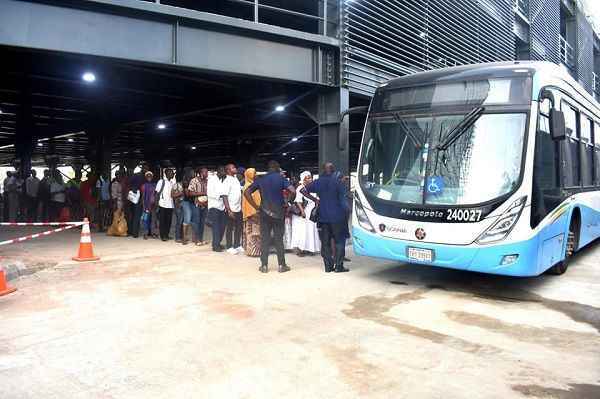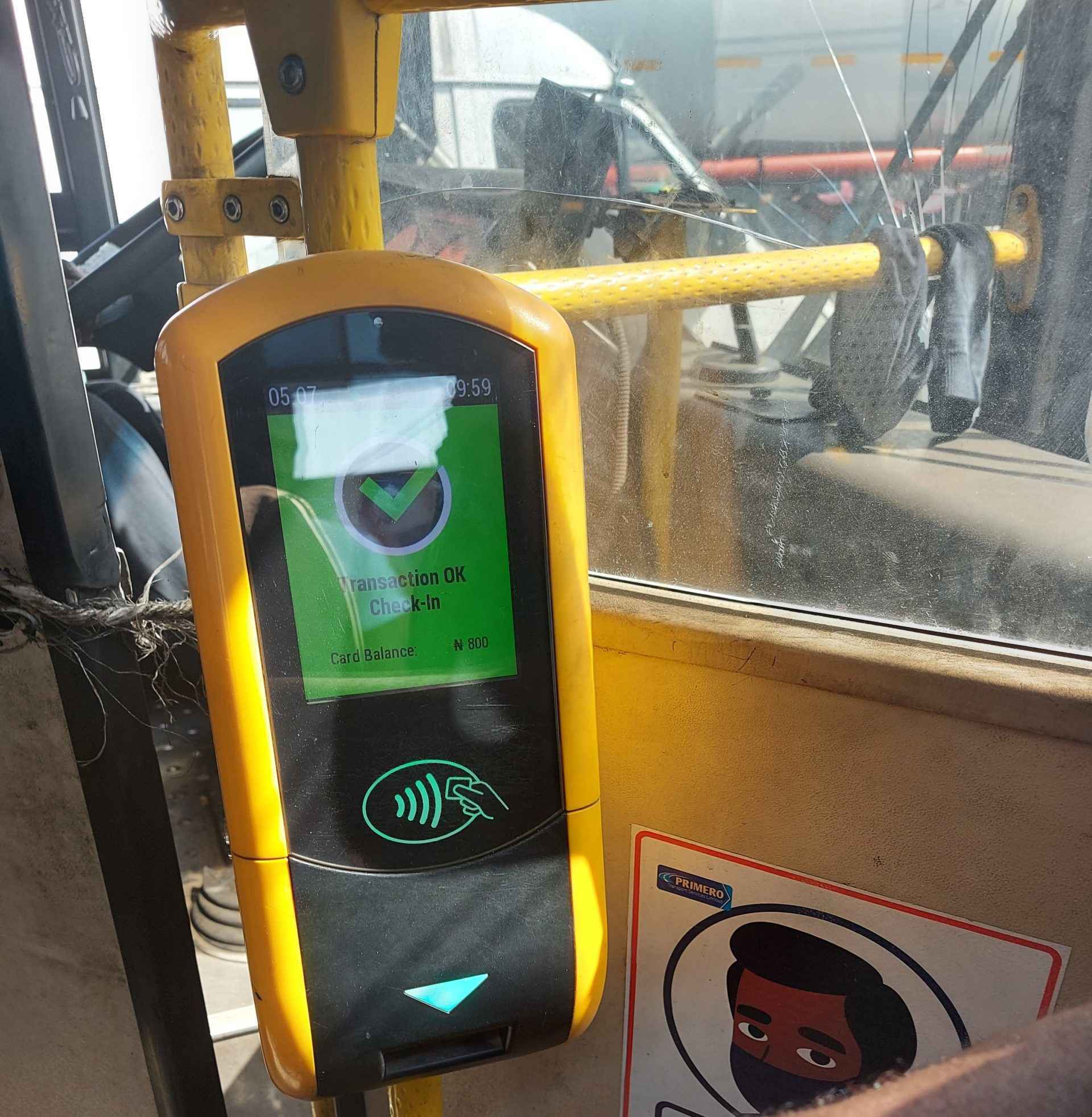
Hundreds of commuters waited at the bus terminal in Lagos' Ikorodu neighborhood on a recent afternoon for the arrival of the Bus Rapid Transit (BRT) buses that would take them to their destinations. A reporter joined the queue with the goal of determining how easy it is for Lagos residents to travel.
One of the buses came an hour and a half later.
As a result, there was a scramble. Passengers who had not previously been in line competed with those already in line for a seat on the bus.
The arrival of a BRT official was required to restore order.
The passengers then started to board using their cowry cards. The card is a reloadable prepaid card that scans the bar code and deducts the necessary fare for the trip when touched against a machine on the bus.
When it came to a middle-aged man's turn, his card was declined owing to a lack of cash.

A new shambles ensued.
“Can you explain me what you're saying? The man yelled at an official, "I loaded N1,000 two days ago and just traveled to Maryland to and forth."
“I should have around N400 remaining, but you're telling me I won't be able to board the bus because I don't have enough money. This is just nonsense.”
The man's actions temporarily delayed boarding as other passengers joined him to recount their own experiences.
Passengers express their disappointment.
Murisiku Amure, an Ikorodu resident, claims he has been overcharged on BRT buses numerous times.
Mr Amure explained, "I typically go to Ketu from Ikorodu, which is a N300 cost."
“What they do is charge N500 when you board the bus, but they refund N200 when you tap out and exit the bus. That was the procedure; it went smoothly for a time, but the system eventually broke down.
“That means if they charge you N500 and the system goes down, you won't be able to tap out and get a refund of N200, so you'll be charged N500 instead of N300. That has been the case for a long time, and many people worry about the lack of transparency in the system,” he explained.
Mr Amure claimed he had another problem with the bus on July 29, when it charged N500 and did not refund the N200 to numerous customers.
“That was how they charged for other people on the bus; it was really noisy, and we were all grumbling about the system.”
“They basically find methods to extort money from individuals, and the transportation isn't cheap either. They used to charge N150 to get from Ikorodu to Ketu, but now they're demanding N300 because of the epidemic, and it's not like the economy is doing well. It's extremely awful for a government bus, a bus that's a public-private collaboration, to not have a transparent system,” he added.
“These funds are really valuable; if you lose N200 for ten days in a month, you have already lost N2,000 to the government,” Mr Amure explained.
Another traveler, Peju Ogunmuyiwa, stated that the lengthy procedure of obtaining a refund discourages passengers from requesting one.

“It isn't even worth it since the procedure and anguish you will experience will be more than the money you would lose,” she explained.
“Imagine wasting hours and experiencing stress because you require the return of your N200.
“They also recognize that many people would refuse to come to them, which is why they have refused to establish a public complaint team at the bus stations.”
Commuters used to take BRT buses because they were cheaper, but that is no longer the true, according to Mrs Ogunmuyiwa.
“In most situations, yellow buses are now less expensive than BRT buses. However, because they use authorized lanes, people continue to use them for convenience and to beat traffic.”
The electronic payment system
The Lagos State government launched the cowry card, a cashless payment scheme that is currently accepted for all modes of transportation in the state, in the year 2020.
The cowry card was originally implemented on all BRT buses in the state by the Lagos State Metropolitan Area Transport Authority (LAMATA). Primero Transport Services Limited, Lagos Bus Services Ltd., Amalgamated Transport Services Ltd., TJ Motors, and Transport Service Ltd. are the companies that operate the buses.
Cowry cards, according to the government, will improve cashless payments in the transportation business.
Tap and Pay Technologies is the company behind the cowry card. It is a centralized payment system that collects fares from all state-regulated transportation service providers and remits a portion to bus operators.
‘An issue with the network'
Primero Transport Service Ltd. spokeswoman Yekeen Mutiu confirmed that the company had received complaints from many clients who had been overcharged using the system.
“As an organization, we are governed by LAMATA; the Lagos State government controls the tap and pay mechanism, but it is our obligation as an organization to address any complaints customers have about our buses.
“We have repaid over N200,000 to those who have been truly overcharged, and we will continue to do so,” he added.
Mr Mutiu claims that network issues are the primary reason of validator failure on some BRT vehicles.
“
We're still dealing with network problems. We are still evolving as a country in terms of technology, therefore there is no way you would have such a large infrastructure and e-payment platform without issues.
“Hits in the technological process are what create technical delays,” he added, adding that some individuals are unable to tap out when they get at their destination.

Mr Mutiu said that validators on all BRT buses had just been upgraded.
“The issue with certain validators refusing to accept cards from consumers has been fixed. “They all take credit cards,” he added.
Customers, according to LAMATA spokeswoman Kolawole Ojelabi, are to blame for many of the problems with the electronic payment system.
According to him, the agency has discovered that passengers fail to tap out, forcing the validator to deduct the whole cost.
“We are attempting to educate the general people on this,” he added.
Mr. Ojelabi said that when using the BRT bus, passengers must tap out at their destination using their cowry cards in order for appropriate fares to be deducted. When riders fail to tap out, the validators believe they have traveled the maximum distance and deduct the comparable fee, according to him.
“Another thing people do is tap out in the middle of the street and stay on the bus. When they're coming down, some of them will still tap out,” he added.
According to the official, those who tap out twice will have their maximum fee withheld, and the agency would educate them about it.
Mr. Ojelabi disputed that bus validators are affected by technology faults or network delays.
“The network has no effect on the system; information is obtained when the network is at its best. “The technology allows you to tap in and out even when you're not on the network; it's not a network issue,” he explained.
Mr. Ojelabi stated that the agency will work with bus companies to have monitors on the bus who will test people's cards and remind them to tap out on a frequent basis.
Local reality, global standard
The digitalization of Lagos' transportation system, according to Oscar Odiboh, a senior lecturer and transportation communication specialist at Covenant University, demonstrates that the state is adopting global norms.
“It should be applauded if the state chooses to become smart, since they are truly following global standards.
“Standards exist all across the world. If you travel to Dubai, Paris, Tokyo, or any other country, you will have a smooth transit experience. “Transportation management is approached from a global perspective,” he explained.
Mr Odiboh stated that the government is attempting to address a number of issues by implementing a digital payment system, including corruption and official misappropriation.
“The government's main goal is to maintain sanity and international norms. The use of technology is maximized to decrease the problem and provide a sufficient return on investment, according to the expert.
According to him, due to various local phenomena, the digitalization of transportation in Lagos would face some hurdles at first.
“If the government is doing something and it isn't totally digitalized or automated, it's because the local reality dictates that you do it slowly. “You can't just wish away the local reality like that,” he added.
Mr. Odiboh went on to say that technology is the mark of global standards, and that it can make ticketing, boarding, disembarking, and managing BRT vehicles a breeze.
According to Dina Adeolu, another expert, the Lagos government's decision to adopt the payment system is part of the smart city project plan, which includes the transition from cash-based to contemporary payment methods.
Mr. Adeolu is a lecturer in the department of transportation management at the University of Lagos. The electronic payment system, he added, will eliminate difficulties connected with the cash-based system, such as loss of income by operators due to insider fraud, robbery of on-duty employees, tardy reporting of financial intake, and others, provided it is used correctly.
The problem, according to the expert, is "teething," which occurs as a result of telecommunications network interruptions, which distorts passenger tapping in and out.
“
Whatever the obstacles, it is the way to go for enhanced public transit operations, particularly in Lagos - Africa's most densely populated area – where there is a need to increase access and acceptability of public transportation, according to Mr Adeolu.
Mr Adeolu went on to say that internet network supply should be reevaluated in order to increase access and avoid the present outages.
